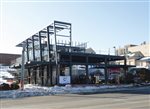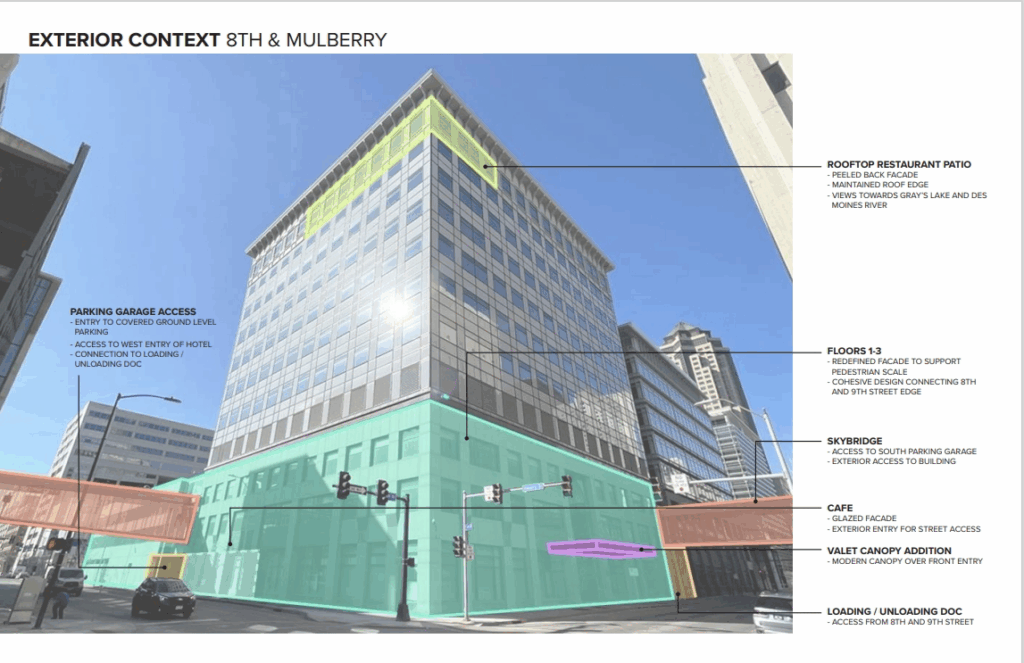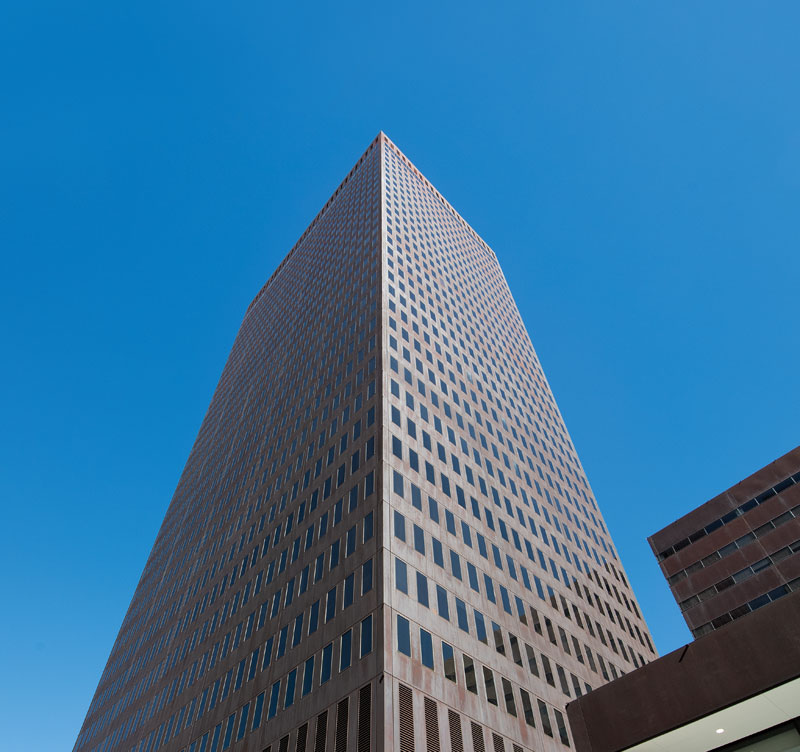2020 was record-setting year for some Des Moines-area communities
For some developers, the year meant looking for new opportunities

KATHY A. BOLTEN Jan 28, 2021 | 4:43 pm
8 min read time
1,827 wordsBusiness Record Insider, Real Estate and Development
Commercial building permits, collectively valued at more than $1.1 billion, were issued by Des Moines-area communities in 2020, a total some consider surprising given the year’s unexpected disruptions caused by the outbreak of COVID-19.
For some communities, 2020 was among their top years for commercial construction.
West Des Moines, for example, issued 171 commercial building permits last year valued at more than $506.8 million. When combined with other types of building permits issued, 2020 was the city’s second-best year in terms of construction valuation, with permits valued at more than $690.5 million issued. West Des Moines’ best year was in 2016 when permits totaling more than $1.06 billion were issued.
“We had a lot of projects already in the works in 2020 and developers just steamrolled through,” said Clyde Evans, West Des Moines’ community and economic development director.
Helping boost the value of West Des Moines’ building permits was the start of construction of buildings in two Microsoft Inc. data centers – Osmium and Azure – as well as interior finishes to the buildings. Five permits with a total value of $394.2 million were issued for the Microsoft projects, a review of the city’s record shows.
While 57% of West Des Moines’ building permit valuation in 2020 came from Microsoft’s projects, the city had other development occur as well, Evans said. A new building for Erik’s Bike Shop is under construction at 950 First St., a Kindercare Child Care center is being built at 865 S. 51st St., seven apartment buildings with a total of 264 units are under construction at various locations across the city, and at least two warehouses are being built.
In Ankeny, more than 25%, or $116.5 million, of the city’s record-setting $423 million in permit valuation in 2020 came from commercial construction, the city’s records show.
“We would be very happy with those results in a regular year, but because of the pandemic, I think those numbers are even more impressive,” said David Jones, Ankeny’s city manager. “We don’t really see it slowing down in 2021.”
The Business Record, through interviews and research, looked back at development in 2020 as well as forward to 2021 and beyond. The following are highlights of what we learned:
2020 was a year of record-setting for some communities
Background: Grimes issued 51 commercial building permits in 2020, valued at more than $78.4 million. Both are records for the city. Among the permits issued for new commercial projects was one for a Hy-Vee Food Store at 351 N.E. Gateway Drive, a new branch office for Dupaco Credit Union at 1701 E. First St. and a new Culver’s restaurant at 1601 E. First St.
Said Alex Pfaltzgraff, Grimes’ director of developer services: “2020 was certainly better than we anticipated it being. In March, everyone was concerned about what sort of economic impacts COVID was going to have on real estate. I think everyone was pleasantly surprised, at least on the real estate side of things, that 2020 was a much stronger year than anticipated.”
Background: Pleasant Hill was among the Des Moines-area communities that issued a record number of building permits in 2020. The eastern Polk County city issued 218 permits valued at more than $60.5 million, which city leaders say is the largest private investment in Pleasant Hill’s history. Included in the permits were six commercial permits valued at more than $7.3 million.
Said Madeline Sturms, Pleasant Hill’s community development director, in a prepared statement: “This year’s growth can be greatly attributed to our city’s completed housing study, which paints a clear picture of our community’s residential and multi-family needs.”
Background: Waukee also had a record-setting year, issuing 1,489 building permits valued at more than $247.5 million. Both are records for the city. The city issued 19 commercial building permits valued at more than $7.3 million. Among the permits issued for new construction was one for a Hy-Vee Fast & Fresh convenience store at 2855 Grand Prairie Parkway, and another for a Kindercare Day Care at 1155 S.E. Kettlestone Blvd.
Said Waukee Mayor Courtney Clarke in a prepared statement: “We’ve watched this pace of development in awe and a bit astonished that even in a year as uncertain and filled with challenges as 2020, interest and investment in Waukee did not wane.”
Pivoting during uncertain times
Background: Jackie Johansen is principal and founder of Shattered Glass Development, which offers a full range of real estate-related services. In early 2020, the company had several projects in what Johansen describes as “the funnel.” Some of those projects were put on hold in March and April with the outbreak of COVID-19. A couple of projects were delayed because of the COVID-related closure of Iowa courtrooms, she said. Some others were put on indefinite hold. The delays prompted Johansen and the group she works with to look for new opportunities, she said.
Johansen on how her team pivoted: “We started spending more time reaching out to rural areas – those on outskirts of metro areas. For example, I met with the city manager of Storm Lake and talked to her about what was her city’s biggest needs. They have a major employer – Tyson – that is growing. … She talked about the need to bring workforce housing to Storm Lake. We’re now working on something that might make that happen. It’s not a done deal by any means, but it’s something we’re working on. We’re also working on bringing senior housing to Storm Lake and some other communities.
“People found during the pandemic that they can work from home and that it’s manageable. Some people now who live and work in the Des Moines metro area are interested in moving to places like Newton and Dallas Center. Those communities have very little inventory when it comes to housing in general. So whether its workforce housing, single-family homes to rent or to purchase – none of which is my typical commercial real estate conversation – we’ve been looking to find builders or developers who have an appetite to go into those communities and maybe do a subdivision that includes single-family, maybe senior living, and maybe some commercial.”
What’s occurring in Des Moines?
Background: The city of Des Moines issued 443 commercial building permits valued at more than $277.3 million in 2020, the city’s records show. And while the year wasn’t record-setting for the capital city, several significant projects began, including:
• A four-story mixed-use building at 2530 University Ave. by Nelson Construction & Development Co.
• Expansion of Helena Industries’ facilities at 3625 Vandalia Road.
• Repurposing of a former big-box store into an outpatient clinic for the Iowa Department of Veterans Affairs at 1211 E. Army Post Road.
• Installing the footings and foundation for an eight-story residential condominium and parking garage project at 3750 Grand Ave.
• Continued development in Gray’s Station, Hubbell Realty Co.’s 84-acre, $250 million residential project south of Martin Luther King Jr. Parkway and west of Southwest 11th Street.
City officials are optimistic for what 2021 will bring, said Carrie Kruse, a Des Moines economic development coordinator. Site work is expected to begin this spring in the Market District, located east of the Des Moines River between the railroad tracks and M.L. King Parkway in a former industrial area, Kruse said. In addition, new development is occurring along Grand and Ingersoll avenues as well as the renovation of existing properties; plans for two new stadiums are moving forward; and redevelopment is occurring in several Des Moines-area neighborhoods, she said.
Kruse on what 2021 holds: “Everyone we’ve talked with is still fairly optimistic about 2021. We’re not seeing any major shifts in plans at this point.
“We are excited about [Kyle] Krause’s announcement about wanting to do a soccer stadium on the [former Dico Inc. site]. We think that will drive additional demand for some commercial development in that area.
“We’ve got a lot of quality-of-life amenities that are being worked on – the Central Iowa Water Trails project [and] the skate park, which is nearly finished.
“The transload project is a big one that will make us more competitive economically.”
Will workers return to the office?
Background: At the start of the pandemic last March, many employers closed their offices and workers began working at home. While some businesses have reopened their offices, many have not yet recalled workers and likely won’t until a large percent of the population has received the COVID vaccine. That likely means office workers won’t return to their workplaces until sometime in this summer, giving top managers time to contemplate how they will handle the return or even whether there will be a wholesale return to working out of office.
Mark Rupprecht, president of R&R Realty Group, which, among other things, develops and manages office space, said he has talked with a number of leaders of various-sized office workplaces about their future plans.
“If you ask them what their long-term plan is, they don’t really know for sure,” he said. “What they are saying to me is, ‘I thought it worked really good at first to work from home. As we got to the fourth quarter, we saw some issues mainly around training, onboarding and some productivity, mainly with younger folks.’ I think there are also some issues around communication and collaboration.”
Company managers have told Rupprecht that while they still want and need office space post-COVID, it will have a different look and feel compared with pre-COVID, he said. “We’re going to see some type of hybrid model.”
Rupprecht on post-COVID office space: “I think we will see a little bit more space per person. I think those areas where people can come together outside of their individual workspace will be even more important because when people are in the office, there will be more collaboration going on. … I’m hearing that amenities will also still be very important. There are a certain number of amenities that you just don’t get in your home – workout facilities, for one.”
The Des Moines area vs. other parts of the U.S.
Background: Many experts say that the Midwest rarely experiences the same economic highs and lows that cities in the Sun Belt or on the East and West coasts go through. The fallout from the pandemic will likely not be as severe in the Des Moines area and other parts of Iowa as in other parts of the country, said Richard Hurd, president of Hurd Real Estate Services.
More from Hurd: “The Des Moines area, as a whole, is healthy. We tend to not overbuild here when times are good. Right now, we’re not terribly overbuilt. We should do OK. Things will reshuffle. Companies will reposition their retail space. [Some retailers] may not need as much space because they are doing more pickup and delivery. … Overall, I don’t think Des Moines is going to be suffering like the bigger markets where you have lots of [speculative] space built.”











